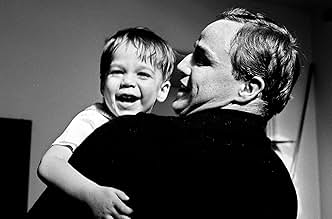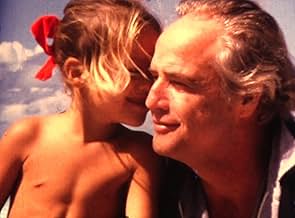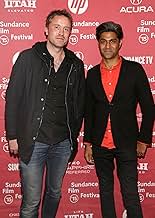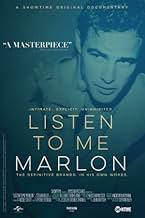IMDb RATING
8.1/10
8.1K
YOUR RATING
A documentary that utilizes hundreds of hours of audio that Marlon Brando recorded over the course of his life to tell the screen legend's story.A documentary that utilizes hundreds of hours of audio that Marlon Brando recorded over the course of his life to tell the screen legend's story.A documentary that utilizes hundreds of hours of audio that Marlon Brando recorded over the course of his life to tell the screen legend's story.
- Director
- Writers
- Stars
- Nominated for 1 Primetime Emmy
- 5 wins & 21 nominations total
Marlon Brando
- Self
- (archive footage)
Stella Adler
- Self
- (archive footage)
- (uncredited)
Bernardo Bertolucci
- Self
- (archive footage)
- (voice)
- (uncredited)
Michael Borne
- Young Marlon Brando
- (uncredited)
Marlon Brando Sr.
- Self
- (archive footage)
- (uncredited)
Christian Brando
- Self
- (archive footage)
- (uncredited)
Dick Cavett
- Self
- (archive footage)
- (uncredited)
Connie Chung
- Self
- (archive footage)
- (uncredited)
Montgomery Clift
- Self
- (archive footage)
- (uncredited)
Francis Ford Coppola
- Self
- (archive footage)
- (uncredited)
Bette Davis
- Self
- (archive footage)
- (uncredited)
Anna Kashfi
- Self
- (archive footage)
- (uncredited)
Elia Kazan
- Self
- (archive footage)
- (uncredited)
Robert F. Kennedy
- Self
- (archive footage)
- (uncredited)
Martin Luther King
- Self
- (archive footage)
- (uncredited)
Sacheen Littlefeather
- Self
- (archive footage)
- (uncredited)
Dorothy Malone
- Self
- (archive footage)
- (uncredited)
- Director
- Writers
- All cast & crew
- Production, box office & more at IMDbPro
Featured reviews
A fascinating look into the life of Marlon Brando, made all the more compelling and unique through its use of Brando's own private audio and rare video recordings. If you're put off early on because it seems to be jumping around and/or it's hard to hear, stick with it. Aside from seeing many examples of Brando's absolutely brilliant acting, we see a complete view of his life, with all of its triumphs and difficulties.
Brando had problems with relationships, children, poor part selections, and was often a pain in the behind to his directors. That may also put people off, but I have to say, this documentary also shows just how laser sharp the man was. The same blistering honesty he brought to his acting roles, he also brought to life. He saw that acting was a means to an end – that time was the true currency of man – and after he had 'made it', he made sure to enjoy his life. He was a pillar of moral rectitude during the Civil Rights movement, standing up for African-Americans and later also for Native Americans. He saw through the phoniness and profiteering in the world, and sought to live his life simply in Tahiti and elsewhere. He had a difficult childhood and relationship with his father, and yet reached a point of forgiveness, understanding that his dad was a product of his own upbringing, and so on, and so on.
Despite the maelstrom of chaos and occasional controversy in his life, what emerges is the coherence of Brando's honesty and his moral code. He humiliated himself by taking parts that were ridiculous and which he later regretted, but if you put that into the context of his life and his priorities, you'll empathize with him, and will be far less prone to laughing at him. I was aware of all the elements of his story, but this documentary really brought it all together for me, and left me admiring the man even more. He was a true hero, a brilliant actor with a social conscience and an intellect that should is under-appreciated.
In terms of the documentary, there are some elements that are less effective. The scenes showing his crude digitized likeness. The audio when it's hard to understand, and which would have been helped with subtitles (turning on close caption helps, even if you're not hearing impaired). The less than even storytelling, though it's always the case that a biographer must choose what to leave in, and what to leave out. With all of that said, director Stevan Riley delivers, and there will be things in this documentary for everyone, regardless of how much you come in knowing about Brando. Strong film.
Brando had problems with relationships, children, poor part selections, and was often a pain in the behind to his directors. That may also put people off, but I have to say, this documentary also shows just how laser sharp the man was. The same blistering honesty he brought to his acting roles, he also brought to life. He saw that acting was a means to an end – that time was the true currency of man – and after he had 'made it', he made sure to enjoy his life. He was a pillar of moral rectitude during the Civil Rights movement, standing up for African-Americans and later also for Native Americans. He saw through the phoniness and profiteering in the world, and sought to live his life simply in Tahiti and elsewhere. He had a difficult childhood and relationship with his father, and yet reached a point of forgiveness, understanding that his dad was a product of his own upbringing, and so on, and so on.
Despite the maelstrom of chaos and occasional controversy in his life, what emerges is the coherence of Brando's honesty and his moral code. He humiliated himself by taking parts that were ridiculous and which he later regretted, but if you put that into the context of his life and his priorities, you'll empathize with him, and will be far less prone to laughing at him. I was aware of all the elements of his story, but this documentary really brought it all together for me, and left me admiring the man even more. He was a true hero, a brilliant actor with a social conscience and an intellect that should is under-appreciated.
In terms of the documentary, there are some elements that are less effective. The scenes showing his crude digitized likeness. The audio when it's hard to understand, and which would have been helped with subtitles (turning on close caption helps, even if you're not hearing impaired). The less than even storytelling, though it's always the case that a biographer must choose what to leave in, and what to leave out. With all of that said, director Stevan Riley delivers, and there will be things in this documentary for everyone, regardless of how much you come in knowing about Brando. Strong film.
Not just a bio-documentary. Far beyond that... Listen to Me Marlon is the presentation of a legend... AS A MAN... By the own legend...
To younger people, such as myself, Marlon Brando was Don Vito Corleone (The Godfather), Colonel Kurtz (Apocalypse Now), Stanley (A Streetcar Named Desire), among many other great performances. But who was the man behind those iconic characters?
In Listen to Me Marlon, is delivered a compilation of many recordings by the actor to the actor himself. I don't think that he would be very pleased to have such tapes out there!
Troubled, charming, talented, politically engaged, passionate... The many faces of the man. Of the liar. When would I imagine that the man who played Don Vito Corleone and Colonel Kurtz, had problems with Francis Ford Coppola? And the tragedies of his personal life? How could I think about Brando as a ordinary guy?
He was no ordinary. And his tapes show it very clearly. Marlon was one unique human being. NO! Not one, two or even more... Marlon talks to himself. But himself is not Marlon... He was no ordinary...
As an art, the movie is beautiful. Not a typical boring documentary, with some footage, a couple interviews, and so and so. The director Stevan Riley was able to capture so many beautiful shots alongside with the music and the very voice of the actor. Flawless...
I know now many more than I ever imagined about Marlon Brando. And now it's like the experience of watching his work means to open so many other doors... Flawless bio-doc. It's a must see if you are interest in the motion picture industry as a whole.
To younger people, such as myself, Marlon Brando was Don Vito Corleone (The Godfather), Colonel Kurtz (Apocalypse Now), Stanley (A Streetcar Named Desire), among many other great performances. But who was the man behind those iconic characters?
In Listen to Me Marlon, is delivered a compilation of many recordings by the actor to the actor himself. I don't think that he would be very pleased to have such tapes out there!
Troubled, charming, talented, politically engaged, passionate... The many faces of the man. Of the liar. When would I imagine that the man who played Don Vito Corleone and Colonel Kurtz, had problems with Francis Ford Coppola? And the tragedies of his personal life? How could I think about Brando as a ordinary guy?
He was no ordinary. And his tapes show it very clearly. Marlon was one unique human being. NO! Not one, two or even more... Marlon talks to himself. But himself is not Marlon... He was no ordinary...
As an art, the movie is beautiful. Not a typical boring documentary, with some footage, a couple interviews, and so and so. The director Stevan Riley was able to capture so many beautiful shots alongside with the music and the very voice of the actor. Flawless...
I know now many more than I ever imagined about Marlon Brando. And now it's like the experience of watching his work means to open so many other doors... Flawless bio-doc. It's a must see if you are interest in the motion picture industry as a whole.
Greetings from Lithuania.
I was dying to see "Listen to Me Marlon" (2015) from the first moment i heard about it. I won't lie - i'm a huge Marlon Brando fan so i was really looking forward to see a good documentary about the man himself. "Listen to Me Marlon" is a superb experience. Experience, because it is not a traditional straightforward biopic documentary. It is told by Brando himself, using audiotapes that he was recording during his life. We do get so see glimpses and most important aspects from his life from a childhood till the end. It shows a bit about the infamous movies he made. But more it is about listening to his thoughts, and they are haunting. It is like listening to extended version of Kurtz himself.
Overall, i highly enjoyed "Listen to Me Marlon". It is informative, superbly paced and very self confident and fascinating documentary. It is a haunting experience, not for everyone i guess, but if you liked the acting of this screen legend and would like to go a bit beyond the face of a man, "Listen to Me Marlon" is a must see.
I was dying to see "Listen to Me Marlon" (2015) from the first moment i heard about it. I won't lie - i'm a huge Marlon Brando fan so i was really looking forward to see a good documentary about the man himself. "Listen to Me Marlon" is a superb experience. Experience, because it is not a traditional straightforward biopic documentary. It is told by Brando himself, using audiotapes that he was recording during his life. We do get so see glimpses and most important aspects from his life from a childhood till the end. It shows a bit about the infamous movies he made. But more it is about listening to his thoughts, and they are haunting. It is like listening to extended version of Kurtz himself.
Overall, i highly enjoyed "Listen to Me Marlon". It is informative, superbly paced and very self confident and fascinating documentary. It is a haunting experience, not for everyone i guess, but if you liked the acting of this screen legend and would like to go a bit beyond the face of a man, "Listen to Me Marlon" is a must see.
I used to idolize Marlon Brando when I was young. Recently, I found his more recent films and physical condition (obesity) to be a true misrepresentation of his true talent. In The Brave, he plays a pervert, but no one remembers that role. He is remembered for the several great roles he played when he was in control of his body and emotions. Listen to Me Marlon is a fabulous collection of tapes played to images (or is it the other way around?) . I teach my students to get the music done first, or the sound track first, and then put images to them. I believe this is how this great documentary was made. What an impressive piece of work. Don't miss it.
If the usual celebrity documentary too often strays into the realm of "Let's see how many famous friends we can find to say nice things about the subject", Listen to Me Marlon, by contrast, is one of the loneliest feeling films about a performer whose works were experienced by so many. Billing itself as comprised from "hundreds of hours" of audio diaries recorded by the man almost universally billed as 'the world's greatest actor', the film is ultimately only half Brando in Brando's own words, interspersing his introspective mumblings with interview and news footage from the actor's life for a more neatly rounded documentary.
With this in mind, it's frustrating that, for a film about the actor celebrated for introducing method authenticity to the big screen, director/editor Stevan Riley indulges in so much cinematic trickery and documentary cliché (you can count the number of transitions not marked by solemn footage of wind chimes rustling on one hand ). Riley particularly gets a kick out of the trope of Brando's digitized head (but with nary a shout out to Brando's posthumously recycled performance in Superman Returns!), even having this CGI rendition 'speak' many of Brando's audio diaries, making significant eye contact with the audience at meaningful moments. Brando himself would likely scoff at the tackiness of this 'ghost Brando', and, while it does add a mesmerizing visual dimension to the 'talking heads' genre (arr arr arr ), it feels overused by the end, particularly while accompanied by the film's distractingly overbearing musical score. Mercifully, Riley stops short of having Ghost Brando sing "Luck Be a Lady Tonight". Shudder.
However, the real draw of the film, the 'Brando on Brando' audio recordings, do not disappoint. Brando has, of late, become almost less famous for his iconic performances as his on-set belligerence (guzzling jars of peanut butter in between takes, reading his lines off a baby's diaper in Superman, or refusing to wear pants on set); here, he is firmly restored as a human being. The Brando we get here is far more earnest and sensitive than the shirt-tearing brute cinema would make him out to be: articulate (no cotton-mouthed mumbling here!), introspective, surprisingly witty, and desperate to have a meaningful impact on the world. Amidst the pontifications on the value and necessity of acting and scorn for the falsities of celebrity – rousing in themselves – there are some movingly raw and emotional moments to be found, as Brando ruminates on the disastrous ramifications of his abusive upbringing and the ripple effects in the tragic lives of his own children, as well as important coverage of his often forgotten work with the civil rights movement from the 1950s-1970s. But, there's warmth to be found amongst the solemnity, as hearing Brando wax poetic about the paradise he found in Tahiti is genuinely moving, and it's hard, by the end, not to feel like he deserved the happiness.
As the film dreamily tumbles through the consecutive stages of Brando's career, it's fascinating to hear him candidly respond to audience reactions to him see-saw from Beatles- level hysteria to condescending indifference and back again through the years (spoiler alert: actors actually are affected by mass criticism!). Riley interweaves compellingly nostalgic clips from some of the earlier works in Brando's career (The Men, Brando's amusingly cringeworthy Mexican in Viva Zapata, Julius Caesar) and the seminal works (A Streetcar Named Desire, On the Waterfront, The Godfather), and hearing Brando's stiltedly pretentious justification for straying into "lighter fare" in Guys and Dolls is just about worth the price of admission alone. Riley particularly devotes focus to the controversy of Mutiny on the Bounty, which Brando attributes both his love of Tahiti and his loss of public favour to, while hearing Brando and Francis Ford Coppola trade barbs about whose fault the disastrous shoot of Apocalypse Now was (amusingly, both try to take credit for Kurtz being mostly kept in shadow – Brando claiming it was his aesthetic take on the character, while Coppola snaps it was to hide how obese Brando had become) is a masterclass of parallel editing in itself.
Listen to Me Marlon may be flimsier than one would hope for such a rich, intimate opportunity – content-wise, there's nothing that couldn't be found in his IMDb biography ¬– but Brando's life and career are wild enough that it still makes for a highly compelling watch. Where the film truly excels is not in facts, but feelings, as Brando himself conveys passion, dry wit, and a voluminous loneliness like none other. If nothing else, Listen to Me Marlon is worth it for granting Brando the true performance of his career: himself – not an overeating, eccentric, reclusive genius, but a human being, vulnerable, flawed, and perpetually yearning to make a difference in himself and the world. Few would dispute it: he was a contender, and he really was something.
-7/10
With this in mind, it's frustrating that, for a film about the actor celebrated for introducing method authenticity to the big screen, director/editor Stevan Riley indulges in so much cinematic trickery and documentary cliché (you can count the number of transitions not marked by solemn footage of wind chimes rustling on one hand ). Riley particularly gets a kick out of the trope of Brando's digitized head (but with nary a shout out to Brando's posthumously recycled performance in Superman Returns!), even having this CGI rendition 'speak' many of Brando's audio diaries, making significant eye contact with the audience at meaningful moments. Brando himself would likely scoff at the tackiness of this 'ghost Brando', and, while it does add a mesmerizing visual dimension to the 'talking heads' genre (arr arr arr ), it feels overused by the end, particularly while accompanied by the film's distractingly overbearing musical score. Mercifully, Riley stops short of having Ghost Brando sing "Luck Be a Lady Tonight". Shudder.
However, the real draw of the film, the 'Brando on Brando' audio recordings, do not disappoint. Brando has, of late, become almost less famous for his iconic performances as his on-set belligerence (guzzling jars of peanut butter in between takes, reading his lines off a baby's diaper in Superman, or refusing to wear pants on set); here, he is firmly restored as a human being. The Brando we get here is far more earnest and sensitive than the shirt-tearing brute cinema would make him out to be: articulate (no cotton-mouthed mumbling here!), introspective, surprisingly witty, and desperate to have a meaningful impact on the world. Amidst the pontifications on the value and necessity of acting and scorn for the falsities of celebrity – rousing in themselves – there are some movingly raw and emotional moments to be found, as Brando ruminates on the disastrous ramifications of his abusive upbringing and the ripple effects in the tragic lives of his own children, as well as important coverage of his often forgotten work with the civil rights movement from the 1950s-1970s. But, there's warmth to be found amongst the solemnity, as hearing Brando wax poetic about the paradise he found in Tahiti is genuinely moving, and it's hard, by the end, not to feel like he deserved the happiness.
As the film dreamily tumbles through the consecutive stages of Brando's career, it's fascinating to hear him candidly respond to audience reactions to him see-saw from Beatles- level hysteria to condescending indifference and back again through the years (spoiler alert: actors actually are affected by mass criticism!). Riley interweaves compellingly nostalgic clips from some of the earlier works in Brando's career (The Men, Brando's amusingly cringeworthy Mexican in Viva Zapata, Julius Caesar) and the seminal works (A Streetcar Named Desire, On the Waterfront, The Godfather), and hearing Brando's stiltedly pretentious justification for straying into "lighter fare" in Guys and Dolls is just about worth the price of admission alone. Riley particularly devotes focus to the controversy of Mutiny on the Bounty, which Brando attributes both his love of Tahiti and his loss of public favour to, while hearing Brando and Francis Ford Coppola trade barbs about whose fault the disastrous shoot of Apocalypse Now was (amusingly, both try to take credit for Kurtz being mostly kept in shadow – Brando claiming it was his aesthetic take on the character, while Coppola snaps it was to hide how obese Brando had become) is a masterclass of parallel editing in itself.
Listen to Me Marlon may be flimsier than one would hope for such a rich, intimate opportunity – content-wise, there's nothing that couldn't be found in his IMDb biography ¬– but Brando's life and career are wild enough that it still makes for a highly compelling watch. Where the film truly excels is not in facts, but feelings, as Brando himself conveys passion, dry wit, and a voluminous loneliness like none other. If nothing else, Listen to Me Marlon is worth it for granting Brando the true performance of his career: himself – not an overeating, eccentric, reclusive genius, but a human being, vulnerable, flawed, and perpetually yearning to make a difference in himself and the world. Few would dispute it: he was a contender, and he really was something.
-7/10
Did you know
- TriviaA documentary made entirely out of archive footage and Marlon Brando's own words from recordings, confessionals, and self hypnosis.
- Quotes
Marlon Brando, Himself: Everything that you do - make it real as you can. Make it alive. Make it tangible. Find the truth of that moment.
- ConnectionsFeatures City Lights (1931)
- SoundtracksInfra 1
Written by Max Richter
Performed by Max Richter, Louisa Fuller, Natalia Bonner, Nick Barr (as Nick Carr), Ian Burdge and Chris Worsey
- How long is Listen to Me Marlon?Powered by Alexa
Details
- Release date
- Country of origin
- Language
- Also known as
- Trái Tim Yêu Thương
- Production companies
- See more company credits at IMDbPro
Box office
- Gross US & Canada
- $425,831
- Opening weekend US & Canada
- $30,068
- Aug 2, 2015
- Gross worldwide
- $516,337
- Runtime1 hour 43 minutes
- Color
- Aspect ratio
- 1.85 : 1
Contribute to this page
Suggest an edit or add missing content









































